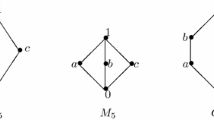Abstract
We briefly analyze two partial order relations that are usually introduced in quantum logic by making use of the concepts of “yes-no experiment” and of “preparation” as fundamental. We show that two distinct posetsE andL can be defined, the latter being identifiable with the lattice of quantum logic. We consider the posetE and find that it contains a subsetE 0 which can easily be orthocomplemented. These results are used, together with suitable assumptions, in order to show that an Orthocomplementation inL can be deduced by the Orthocomplementation defined inE 0, and also to give a rule to find the orthocomplement of any element ofL.
Similar content being viewed by others
References
Beltrametti, E. G., and Cassinelli, G. (1976). “Logical and Mathematical Structures of Quantum Mechanics. ”Rivista del Nuovo Cimento,6, 321.
Beltrametti, E. G., and Cassinelli, G. (1979). “Properties of States in Quantum Logic,” inProblems in Foundations of Physics, Proceedings of the International School of Physics “Enrico Fermi.” North Holland, Amsterdam.
Bourbaki, N. (1966).Eléments de Mathématique, Théorie des Ensembles, Chap. 2. Hermann, Paris.
Jauch, J. M. (1968).Foundations of Quantum Mechanics. Addison-Wesley, Reading, Massachusetts.
Mackey, G. W. (1963).The Mathematical Foundations of Quantum Mechanics. W. A. Benjamin, New York.
Maczynski, M. J. (1972). “Hubert Space Formalism of Quantum Mechanics without the Hubert Space Axiom,”Reports in Mathematical Physics,3, 209.
Mielnik, B. (1969). “Theory of Filters,”Communications in Mathematical Physics,15, 1.
Mielnik, B. (1974). “Generalized Quantum Mechanics,”Communications in Mathematical Physics,37, 221.
Mielnik, B. (1976). “Quantum Logic: Is It Necessarily Orthocomplemented?” inQuantum Mechanics, Determinism, Causality and Particles, Ed. M. Flato et al. Reidel, Dordrecht.
Piron, C. (1964). “Axiomatique Quantique,”Helvetica Physica Ada,37, 439.
Piron, C. (1976).Foundations of Quantum Physics. W. A. Benjamin, Reading, Massachusetts.
Pool, J. C. T. (1968a). “Baer*-Semigroups and the Logic of Quantum Mechanics,”Communications in Mathematical Physics,9, 118.
Pool, J. C. T. (1968b). “Semimodularity and the Logic of Quantum Mechanics,”Communications in Mathematical Physics,9, 212.
Author information
Authors and Affiliations
Additional information
Research sponsored by C.N.R. (Italy).
Rights and permissions
About this article
Cite this article
Garola, C. Propositions and orthocomplementation in quantum logic. Int J Theor Phys 19, 369–378 (1980). https://doi.org/10.1007/BF00671989
Received:
Issue Date:
DOI: https://doi.org/10.1007/BF00671989




